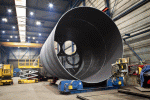
Swedish company Paperboard SA is one of the world’s leading manufacturers of high quality cardboard and paper for the packaging and graphics industries. At its plant in Workington, two of the largest double flame tube boilers in the world will be installed this year to provide a reliable supply of process steam.
Process steam for 330,000 tons of high-grade packaging cardboard per year
400 employees work at the Workington plant, where 200,000 tons of high-quality chromo board are manufactured annually. Large amounts of the steam is required for the industrial production of paper and cardboard products. Cellulose fibers are mixed into a watery pulp. A screen skims individual layers off which are then dried, pressured and smoothed using steam.
Up to 118 tons of steam per hour
Both boilers come from HKB, Viessmann Group specialist for hot water and steam boiler systems built to project specifications. The two Vitomax D HS double flame tube boilers provide up to 118 tons of steam per hour. The burner output per flame tube is roughly 19 megawatts but because each boiler has two burners, total burner output at full capacity is 38 megawatts per boiler.
Considering these impressive figures, it is very important to use the natural gas fuel as sparingly as possible to ensure economical operation. Both Vitomax boilers are equipped with economisers which are exhaust gas/water heat exchanger that capture waste heat from the exhaust gas to prewarm boiler feed water. Elaborate sensor technology will monitor temperature and pressure at various locations in the system, in addition to the actual boiler control.
Sea Transport
Each of the two Vitomax D HS steam boilers will be more than 11 metres long and weigh nearly 100 tons. With these kind of weights and dimensions, sea freight is the ideal method of transporting the boilers to the installation site. HKB’s plant in Venlo, Netherlands, is only 300 metres away from the port on the river Maas, from where the Vitomax boilers will first travel via inland waterway to Rotterdam. The boilers will then be transferred to ocean ships, which will pass through the English channel to Workington.
